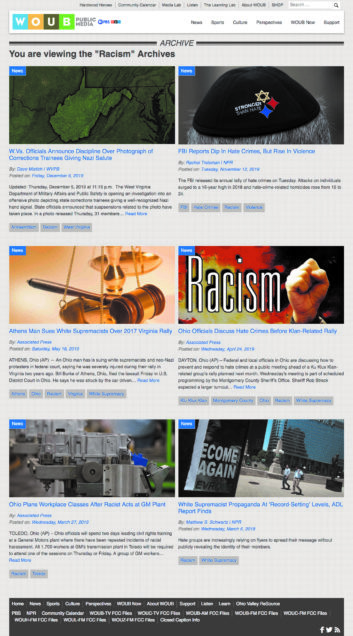Many years ago as a DJ at a rock station, I became friends with a bartender who was a regular listener of my show. He seemed like a solid guy, and I admired that while he poured drinks for a living, he did not drink.
One morning perusing the newspaper, I saw a headline about a KKK rally that had occurred that weekend, with a photo of a bunch of guys in white robes carrying crosses through the center of town. The leader had taken off his hood.
Much to my shock, I recognized my “pal,” the bartender. An ugly snarl on his face, he was screaming something at the crowd.
I felt sick as the realization hit me for the first time that it’s impossible to know what hatred lies in a person’s heart.
WORK TO DO
For a long time, I thought racism in America was decreasing; but social media, videos on YouTube and continuous targeted racist violence clearly indicate that our country has a long way to go.
Historically, the radio industry has contributed both to perpetuating racism and educating listeners to fight against it. While the scales have certainty tipped toward education, tolerance and awareness, we have much work to do. Perhaps the few examples that follow can kickstart a New Year’s plan at your station.
-

The website of WOUB in Athens, Ohio, provides searchable tags for racism and hate crimes. Let’s begin by recognizing public radio for the range and timeliness of stories that NPR and affiliates are running on the air and featuring prominently on station websites. Search the term “racism” plus a set of public radio call letters, and you will often encounter a page focused purely on stories pertinent to the issue.
- CBS local websites also cover the topic, as do many other commercial broadcasters.
- It’s best when the stories are aggregated under one tag for archive viewing and for search purposes. I’m hopeful that most of these stories make it on the air as well as the websites. When time doesn’t permit, it does make sense to do shorter on-air stories with a reference to details on the website.
- Promotionally, there’s much all radio formats can do to help organizations that fight racism and other forms of hatred. As you’re looking at your 2020 event calendar, could you schedule a month during which you work with a local non-profit to raise awareness, volunteerism and money? Make sure to utilize on-air PSAs running with good frequency. This is also a rare opportunity for you to involve local religious institutions in all aspects of your plan. Churches, synagogues and mosques have people whom they can activate through social media, mailing lists and pulpits.
- For talk/news formats, there’s no question that it takes an ever-vigilant program director to work with hosts on understanding what constitutes racism and how to deal with live callers who are on a mission to spread hatred. Racism and hate speech, from the right or the left, is wrong and has no place on American radio. Industry veterans know that it’s a small but vocal part of the audience, often trolls, who call in a lot. If you have hosts who can handle the rants, that’s terrific, and the calls can be transformed into a learning moment; but when it becomes repetitive and tedious to deal with the same callers, a number block may be in order.

- There are already many podcasts focused on racism and cultural intolerance. Does your parent company have one you can help promote, or is the topic of enough interest in your market to support your own effort? Either way, be sure to promote on-air and through all of your platforms.
- When is the last time you had a staff discussion concerning racism and cultural intolerance? If the answer is a long time ago, or never, this is the time of year to get it done. Many experts are available to help you tackle this tough topic on two levels: how you approach issues on-air and at remotes and, perhaps even more sensitive, in your station’s own environment.
Whatever one’s background, each of us benefits from enriching our self-awareness as regards social diversity and learning more about how others can do so as well. As we enter a new decade, let’s take the opportunity to help keep life peaceful for everyone.







